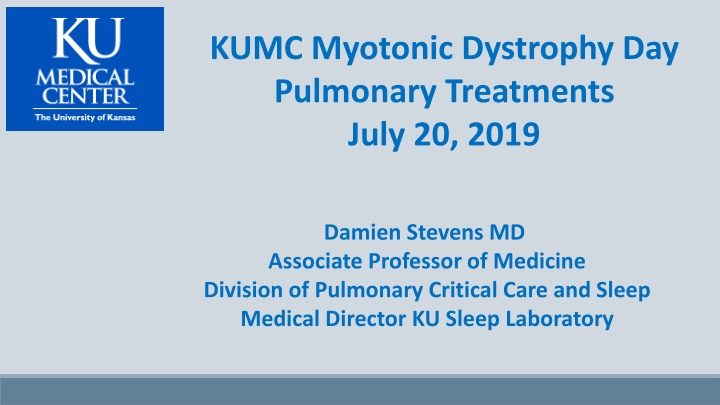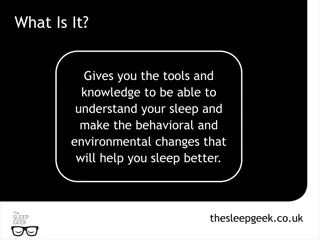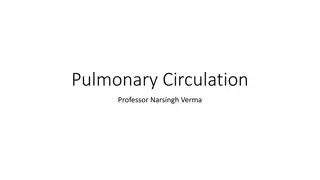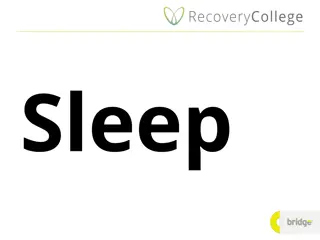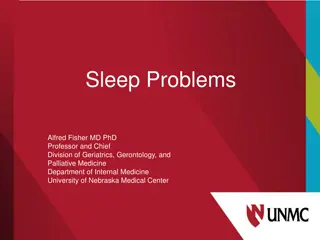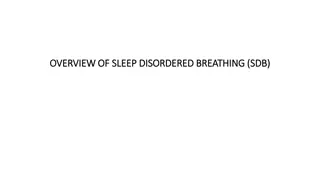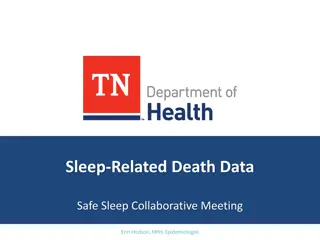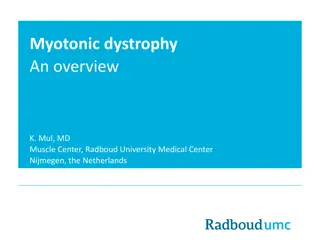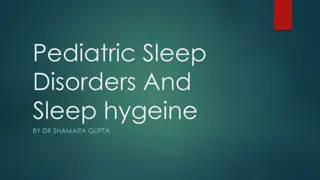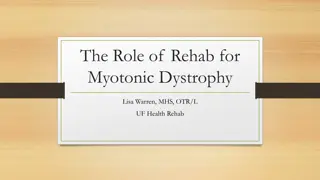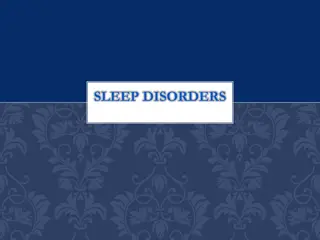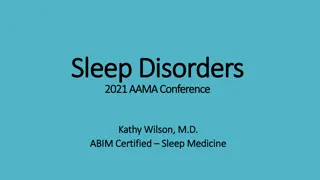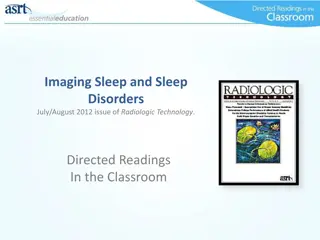Pulmonary and Sleep Management in Myotonic Dystrophy
Myotonic dystrophy presents challenges in respiratory and sleep function. The condition can lead to pulmonary complications, such as ineffective cough, pneumonia, and respiratory failure, making proactive management crucial. Treatment strategies include vaccinating against infections, utilizing ventilatory support, and addressing sleep disturbances. Regular assessment and intervention are essential to improve quality of life and prevent complications in individuals with Myotonic Dystrophy.
Download Presentation

Please find below an Image/Link to download the presentation.
The content on the website is provided AS IS for your information and personal use only. It may not be sold, licensed, or shared on other websites without obtaining consent from the author.If you encounter any issues during the download, it is possible that the publisher has removed the file from their server.
You are allowed to download the files provided on this website for personal or commercial use, subject to the condition that they are used lawfully. All files are the property of their respective owners.
The content on the website is provided AS IS for your information and personal use only. It may not be sold, licensed, or shared on other websites without obtaining consent from the author.
E N D
Presentation Transcript
KUMC Myotonic Dystrophy Day Pulmonary Treatments July 20, 2019 Damien Stevens MD Associate Professor of Medicine Division of Pulmonary Critical Care and Sleep Medical Director KU Sleep Laboratory
Respiratory and Sleep Issues in Myotonic Dystrophy Pulmonary complications leading cause of death in DM1 Ineffective cough Pneumonia Chronic respiratory failure Acute respiratory failure Sleep disordered breathing Excessive daytime sleepiness
Respiratory Issues in Myotonic Dystrophy Ineffective cough Normal peak expiratory flowrate is >270 liters/minute Maximal inspiratory pressure is <60 cm H2O FVC values of 50% less than predicted Vaccinate for pneumonia and influenza Treat respiratory infections quickly Use cough assistance as needed Noninvasive ventilatory assistance as needed
Respiratory Issues in Myotonic Dystrophy Some patients will eventually require nighttime ventilator support or continuous ventilation. Most patients with chronic respiratory insufficiency respond to noninvasive ventilatory support (NIV). Use supplemental oxygen with caution and in conjunction with NIV Patients experiencing acute respiratory failure require endotracheal intubation Preoperative evaluation and clearance if need for anesthesia.
Sleep Issues in Myotonic Dystrophy Assess with Epworth Sleepiness Scale or a similar instrument Sleep study if sleep disturbance is suspected Nocturnal oximetry possible useful Possible obstructive sleep apnea or central sleep apnea Sleep study often indicated depending upon symptoms Excessive daytime sleepiness not explained by other process
Sleep Issues in Myotonic Dystrophy Nocturnal or daytime hypoventilation also can be seen Noninvasive positive pressure ventilation may be beneficial Pressure cycled versus volume cycled assistance Consider referral to a pulmonologist
Sleep Issues in Myotonic Dystrophy Excessive daytime sleepiness can be difficult to treat Typically corelates with severity of other organ disease Wake promoting agents typically first line option Stimulants can be effective
